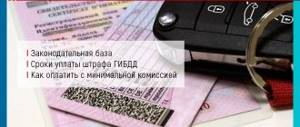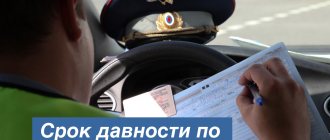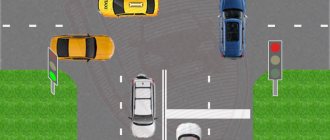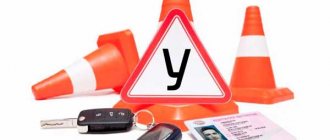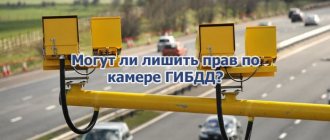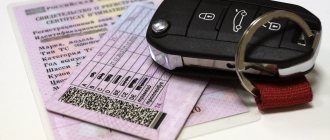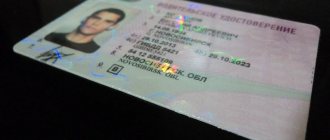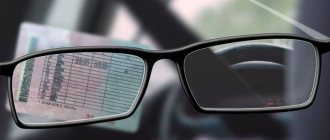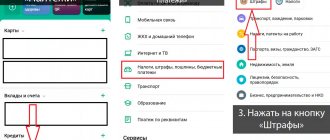A drunk driver poses a danger not only to himself, but also to other road users. Punishment for drunkenness and transfer of control of a vehicle to a person who is intoxicated is provided for in the Code of Administrative Offenses of Russia. According to Art. 12.8 the court has the right to deprive the driver of his license and impose a large fine. Drivers who consider double punishment excessive are looking for an opportunity to take away their license without paying an administrative fine of 30,000 rubles. The law provides for deferred and installment payment options. In addition, in some cases, driving licenses are restricted by bailiffs.
Is there a way not to pay a fine of 30,000 rubles
Punishment for driving a vehicle while intoxicated is an integral part of the sanction under Art. 12.8 Code of Administrative Offenses of Russia. You can take away your license without paying a fine of 30,000 rubles only in cases where a technical error has occurred and there is no information about the imposition of a penalty in the traffic police database. It is possible not to pay 30 thousand rubles upon deprivation of a license if it was not previously collected, the statute of limitations has expired, and the punished driver does not plan to regain the right to drive vehicles.
Important! After the expiration of the period of deprivation of rights, in order to return them, you must pay a fine, provide a medical certificate and pass an exam.
What's the fine?
You may be charged under one of 3 articles of the Code of Administrative Offences, if you get behind the wheel after the end of your deprivation without taking away your license:
- Part 2 of Article 12.3 of the Code of Administrative Offenses – for not having a driver’s license with you, 500 rubles fine,
- Part 1 of Article 12.7 of the Code of Administrative Offenses - for lack of the right to drive, a fine of 5 to 15 thousand rubles,
- Part 2 of Article 12.7 of the Administrative Code - for driving while deprived of a license, a fine of 30,000 rubles or arrest for up to 15 days.
This is interesting: The statute of limitations for collecting damages for road accidents is 2021
In practice, in 2021, any of these three fines may be issued against you, depending on the understanding of a particular traffic police officer and the prevailing practice in a given location. Yes, even depending on the inspector’s mood.
Statute of limitations for fines for deprivation of rights
The statute of limitations for collecting fines is determined by 31.9 of the Code of Administrative Offenses of the Russian Federation, and for those punished under Art. 12.8 of the Administrative Code is 24 months. There is a misconception that after two years the driver is exempt from paying.
The statute of limitations for drunk driving penalties depends on whether the penalty order was enforced. If the fined driver evaded payment and enforcement proceedings were initiated against him, the two-year statute of limitations is suspended while the evader is being searched for.
We talked in detail about what will happen if you hand over the steering wheel to a person without a license in this article.
How long does it take for traffic police fines to expire?
So, if you don’t pay traffic fines, they will expire—the data is current as of May 26, 2021. This happens 2 years after the date of entry into force of the decision on such a fine. Article 31.9 of the Code of Administrative Offenses tells us this:
Article 31.9. The limitation period for the execution of a decision to impose an administrative penalty.
1. A resolution on the imposition of an administrative penalty is not subject to execution if this resolution has not been enforced within two years from the date of its entry into legal force.
As you can see, everything is simple! Execution of a punishment is the payment of a fine, and if the fine has not been executed within two years from the date it entered into legal force, it expires.
But what is the effective date? According to the same Code of Administrative Offenses (Article 31.1), this is the date on which the period for appealing the decision on a fine expires. That is, first the inspector makes a decision (namely a decision, not a protocol), then there is a period during which this decision can be appealed, and after this period the decision comes into force, and it can no longer be appealed. The appeal period for almost all traffic fines is 10 days. But this period is interrupted if you appeal the decision.
If the decision was made not by the inspector, but by means of automatic recording, then the period for appeal begins after the driver has been properly notified of the punishment. Such notification is a registered letter with a copy of the resolution received by the driver at his place of registration if he did not evade receiving it.
Example: citizen Ivanov committed a violation on June 3, 2021 - he was driving at an excessive speed, which was recorded by a self-driving camera. As a result, a resolution was drawn up against him, issued on June 5 of the same year, and a copy of the resolution was sent to Ivanov by mail. Ivanov received this copy on June 14, 2021, and did not appeal this fine.
As a result, we get the following timing:
- The date of entry into force of the resolution is June 24, 2016 (date of receipt of the copy + 10 days for appeal).
- The expiration date for the fine is June 24, 2018.
It seems like nothing complicated, doesn’t it?! But in reality, fines are burned in this way very rarely. The fact is that the state takes good care of replenishing the budget, so it will not allow you to simply not pay a fine - this will be discussed below.
Responsibility for late payment
By ignoring the payment deadlines, the driver aggravates his situation and violates the Code of Administrative Offences, Art. 20.15. If funds are not received within 70 days after the penalty is imposed, the law provides:
- doubling the amount of payments;
- arrest for up to 15 days;
- involvement in compulsory work for up to 50 hours.
Debt on fines leads to a ban on crossing the state border. Debt collection is the responsibility of the FSSP. To ensure repayment, bailiffs have the right to seize property and sell it to pay off the debt.
What are the deadlines for a traffic police fine?
In order to understand how to correctly count 2 years in our article, you need to find out what the general terms of administrative punishment are. And in total, according to the Code of Administrative Offenses in force for 2019, there are 5 of them:
- 10 days is the period for the administrative fine of the traffic police to come into force in cases where it is not appealed,
- 10 days + consideration period – this is how much longer the entry into force of the punishment is extended if you appealed the decision for violating traffic rules,
- 60 days is the period for execution of the punishment; in simple terms, this is the period for paying the fine, and it begins after it enters into legal force,
- 3 months (not to be confused with 90 days) – the term for prosecution under Article 20.25 of the Code of Administrative Offenses for failure to pay a fine with a new penalty in the form of a double fine from the previous one or arrest for up to 15 days; This period begins from the date of formation of the composition for late payment - after the deadline of 10+60 days given for entry into force and payment.
Where is the fifth?! It is precisely this that is 2 years - and this is the period for the execution of the punishment, that is, the collection of a fine, including by force.
Payment by installments
Pay a fine under Art. 12.8 of the Administrative Code is necessary within two months. Another 10 days are given to the citizen to appeal penalties and deprivation of rights. If a citizen’s financial situation does not allow for a one-time payment, he has the right to apply for payment in installments. Necessary:
- draw up an application for installment payment of a fine in free form;
- state the circumstances preventing a one-time payment;
- attach documents confirming your difficult financial situation.
The judge reviews the application, examines the facts and makes a decision whether to grant the application or deny it. If a positive decision is made, the payer is given an individual installment plan up to 90 days inclusive.
Important! The payment deadlines proposed by the court cannot be violated. If the fine is not paid, enforcement proceedings will be initiated and the funds will be collected by the bailiff.
What will happen in 2 years with fines?
From the above, it becomes clear that if the fine is not paid on time, then forced collection of money occurs. The documents are sent to the bailiffs after the required 70 days, when the punishment is overdue. You can find out whether documents have been submitted for forced payment by visiting the official portal of bailiffs.
Let's find out how the procedure for forced collection of fines for traffic violations works. In Russia, the State Traffic Inspectorate has the right to draw up documents for punishment. But she cannot carry out the prescribed measures - the bailiff service, which has its own regulations, is responsible for this.
The issue related to the statute of limitations for fines is regulated in 2021 by two laws:
- If within two years the traffic police officers have not handed over the order for punishment to the bailiffs, then after that this right is lost. This is established in the law on enforcement proceedings FZ-229 in Article 21, Part 7.
- If the State Traffic Inspectorate transfers documents for a fine to the bailiffs, more than 2 years have passed since the entry into force of the resolution, and you have not paid this fine and forced collection by the bailiffs, it is canceled in accordance with the Code of Administrative Offenses, Article 31.9, Part 1.
Therefore, the statute of limitations is set by law at 2 years. If the fine is not paid within the specified period, then the penalty “burns out” and there is no need to pay it.
However, there are some features and exceptions to this rule.
When the fine does not expire
This situation occurs under the following conditions:
- If the driver intentionally evaded paying the fine during enforcement proceedings.
- If the court establishes a deferred payment.
How to understand evasion of paying a fine? This is the intent of the car owner who refuses to pay the penalty. If the bailiffs have initiated proceedings against you, but you do not show property, money, or are hiding, then such actions are called evasion.
But the subtlety of this issue lies in the need to prove evasion. It is necessary to prove the presence of intent to conceal property and other information. If you do not own bank cards on which there is money, the apartment is closed while you are at work, then this is not considered evasion. In this case, the two-year period for late fines is not interrupted.
Will the fine of 30,000 for deprivation of rights expire?
Such a fine also “burns out”, and for this the Federal Law and the Administrative Code will not be an exception. Many car owners mistakenly think that a fine of 30 thousand rubles is determined specifically for deprivation of rights. The Administrative Code defines it not for deprivation, but for driving while intoxicated, or refusal to undergo a medical examination. So when you get your license back, you may be disappointed. This will be discussed below.
Payment Methods
The payment deadline is 70 days after the decision is made. If the driver has a Sberbank card, he can see a notification in his personal banking account, where he can also pay the debt. An automatic notification of unpaid fines is sent to your State Services account if you are registered. By linking the card to your personal account on the site, you can make a payment online. Those citizens who do not have electronic registration on the State Services portal and do not use a personal banking account have the right to pay a fine to the traffic police in cash on a receipt.
Return of rights in case of unpaid fine
To return a driver's license that was previously confiscated for driving while drunk, you must pass a theoretical exam on your knowledge of traffic rules and provide proof of payment of the fine. Such a document can be a receipt or statement of bank account transactions for non-cash payments. The traffic police database contains information about penalties imposed on drivers, so you will have to pay all debts.
Important! The date of deprivation of rights should be considered not the moment the decision was made, but the date of actual surrender of rights by court order.

